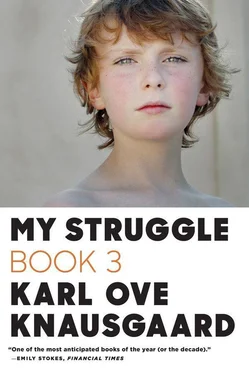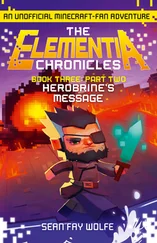“We don’t want anything,” I said, swallowing, my throat thick with desire.
“Nothing,” Lars said.
I stroked her crotch, placed my whole hand against it, and could have screamed out with happiness and frustration. Lars snuck a hand up to her jacket zipper and pulled it down, then put his hand up her sweater. I did the same. Her skin was hot and white, and I felt her breasts in my hand. The nipples were stiff, her breasts firm. I stroked her thigh again, put my hand on her crotch again, but then, gulping repeatedly, I made the mistake of pulling down the zipper of her trousers.
“No,” she said. “What are you thinking of?”
“Nothing,” I said.
She straightened up and pulled down her sweater.
“Any more chocolate?” she said.
“Yes, help yourself,” Lars said, and we sat there eating chocolate and staring across the sea as if nothing had happened. The breakers resembled white snowdrifts the second they crashed against the smooth, low rocks. Some seagulls swept past with their wings flapping. When the box was empty we got up and walked back through the forest to the fair. Kjersti said goodbye, see you later perhaps, and we decided to go home. But to do that we had to drop by the lottery stall to collect our bikes. Øyvind, our coach, was there, and he didn’t look happy when he caught sight of us. We denied everything. He said he couldn’t prove anything, but he knew what we had done. Why else would we have been content with half the prize? We denied it point blank. He said he was disappointed, he didn’t want to have to look at us any more that day, and we cycled home.
On Monday, before school began, Lars lifted up Siv’s sweater and I pressed both my hands against her breasts. She screamed and said we were childish and calmly walked off.
In the first lesson, which was Norwegian, we had to borrow a book from the library, read it during the week, and then write about it in an essay. I said I had read all the books in the library. Kolloen didn’t believe me. But it was true. I could tell him about every book he pulled out. In the end he allowed me to write about another book. Which meant I had nothing to do that lesson. I took out a history book and sat at the desk under the window. Outside, it was misty but warm. The playground was deserted. I flicked through the book and looked at the pictures.
Suddenly I saw one of a naked woman. She was so thin her hips protruded like bowls. All her ribs were visible. Between her legs there was a small, black tuft. Behind her there were rows of bunk beds in which I glimpsed other female figures.
My insides shook.
Not because she was so thin but because there was nothing attractive about her, although she was naked, and because on the next page there was a picture of an enormous pile of corpses in front of a deep grave where many bodies lay strewn. What I saw was this: the legs were only legs, the hands were only hands, the noses were only noses, the mouths were only mouths. Something that had been shaped and formed elsewhere was now here, scattered across the ground. When I stood up I felt nauseous and confused. As I had nothing to do I went out and sat against the wall. The sun warmed, despite being covered by mist. The grass growing in the cracks and hollows of the boulder in the middle of the playground, surrounded by walls and tarmac, was long and swayed to and fro in the gentle breeze. The nausea didn’t pass, it became associated with what I saw, it became a part of them. The green grass, the yellow dandelions, Siv’s bare breasts, Kjersti’s fat thighs, the skeletal woman in the book.
I got up and went back in, called Geir, and he came over with a quizzical look.
“I’ve found a picture of a naked woman,” I said. “Do you want to see it?”
“Of course,” he said, and I opened the book in front of him and pointed to the skeletal woman.
“That’s her,” I said.
“Oh, my God,” Geir said. “Ugh.”
“What’s the matter?” I said. “She’s naked, isn’t she?”
“Oh, yuk,” Geir said. “She looks as if she’s dead.”
That was exactly how she looked. Like the living dead. Or death in living form.
The next weekend Mom and I went to visit Dad. It was odd to see him in his flat. It was on a higher floor in a tower block, it was all white, the sun shone in through the windows, filling it completely, and there was so little furniture it almost seemed as if no one were living there.
What did he do here?
He drove us to Grandma and Grandad’s, where we ate, and then he drove us home. No one quite seemed to know when we were going to move, it was dependent on so many factors, the house had to be sold, a new one had to be bought, Mom had to find a job, we had to change schools, so I didn’t think too much about it. But I had no objection to leaving the estate or the school. It felt as if all my cards had been played. I made mistake after mistake. One day after gym, for example, when I was standing in the corridor outside the classroom, Kjersti came over to me.
“Do you know what, Karl Ove?” she said.
“No,” I said, fearing the worst, for her expression was sardonic.
“We’ve just been talking about you,” she said. “And we discovered that not one of the girls in the class likes you.”
I said nothing, I glared at her, filled with a sudden, enormous fury.
“Did you hear me?” she continued. “Not one of the girls in the class likes you!”
I smacked her cheek as hard as I could. The flash of my arm and the following slap, which turned her cheek crimson, caused people to turn their heads.
“You bastard,” she shouted, and punched me in the mouth. I grabbed her hair and pulled. She hit me in the stomach, kicked me in the calf, and grabbed my hair, too, we were a whirl of blows and kicks and hair-pulling, and I, poor, pathetic, miserable little shit, I burst into tears, it all became too much for me, a pathetic sob escaped my mouth; all those who had gathered around us within the space of seconds shouted, he’s crying, I heard them, but I couldn’t stop myself, and then I felt a heavy hand on my collar, it was Kolloen, he was holding Kjersti in the same way and asked what on earth was going on, are you fighting ? I said it was nothing, Kjersti said it was nothing, and then we were frog-marched into the classroom, each with a teacher’s hand in the middle of our backs, me a laughingstock, for I had not only broken the rule about never crying but also the one about never fighting with a girl, Kjersti now had the status of a hero, for she had been hit and hit back, and she didn’t cry.
How low can you sink?
Kolloen said we had to shake hands. We did, Kjersti apologized, and smiled at me. The smile was not sardonic, it was heartfelt, in a way, as though we were complicit in something.
What did it mean?
In the last week of May the heat came, the whole class set off for Bukkevika to go swimming, the sand was white, the sea blue, and the sun burned in the sky above us.
Anne Lisbet emerged from the sea.
She was wearing a bikini bottom and a white T-shirt. It was wet, and her round breasts were visible. Her wet, black hair shone in the sun. She beamed her broadest smile. I watched her, I couldn’t keep my eyes off her, but then I noticed something beside me, and turned my head, and there was Kolloen, he was watching her, too.
There was no difference in our gazes, I realized that at once, he saw what I saw and he was thinking what I was thinking.
About Anne Lisbet.
She was thirteen years old.
The moment didn’t even last for a second, he looked down as soon as I noticed him, but it was enough, and I’d had an insight into something that a moment before I didn’t even know existed.
Three days later Dad picked me up from school early, we were going off to look at a house, it was twenty kilometers from Kristiansand, by a river, we were considering buying it, now I had to say what I thought, and I had to be honest. From the way Dad was talking — it had a barn, the house was old, from the 1800s, it was on a big piece of land, you could have a normal garden and a vegetable garden, too, there were big, old fruit trees growing there, and perhaps we could keep hens, as well as grow our own potatoes, carrots, and herbs — I had already decided, I would tell him I liked it, whether I did or not.
Читать дальше












